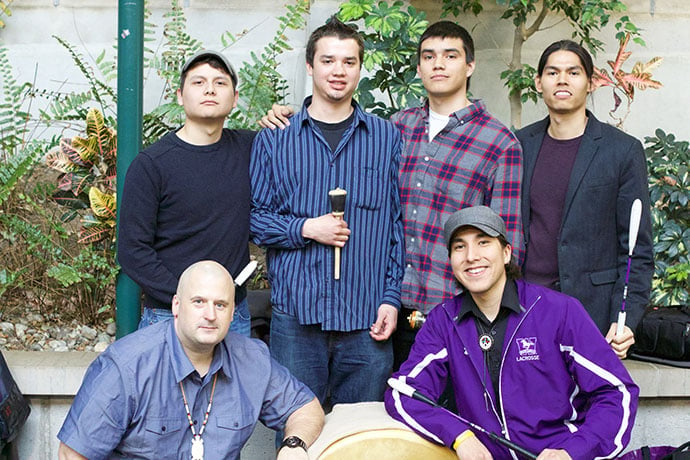Do you ever think about how amazing language is? Of course it allows us to talk to one another, but it is also the main way we share our cultures and knowledge with one another.
This is why when languages begin to disappear it is so important we work to preserve them. An issue that is made even more important by the fact that of the approximately 6,700 languages spoken in the world, 4,000 of them are only spoken by 6% of the world’s population! This 6% is mainly made up of the Indigenous peoples of the world. Which includes members of the First Nations, Inuit, Métis, and Indigenous Americans here on Turtle Island (North America). As a direct result of colonization (the use of violence to force environmental, political, and social changes upon Indigenous communities) the languages and culture of these communities have been partially erased. As a result the languages, cultures and knowledges of these peoples are in danger of disappearing.
One of the ways in which Indiginous communities are working against the loss of their languages is through the process of digitization, a process that is sometimes called Indigitization.
Indigitization can be broken up into two processes: preserving language resources through digital means, and then using digital tools and educational resources to create new speakers. Kind of like how your teacher uses the information from textbooks to teach you new things.
Digital Preservation
When it comes to preserving endangered languages, there has been an effort to digitize the language resources the best we can. This usually involves digitizing older recordings on cassette tapes, which are an old school way of recording sound that used two wheels of magnetized tape. And then there is also the ability to connect with some of the remaining speakers of endangered languages over platforms like Zoom, and when safe, in person. All of this though has to be done in a way that focuses on the needs of the speaker and community.
Teaching Endangered Languages
Just like there are different ways to teach math, there are a bunch of ways these languages can be taught. One of the main ways though has been through the creation of new softwares and Apps. This is where in my opinion things get really cool!
One project that was developed in Canada involves the creation of a python based verb conjugator software called WordWeaver. What makes this conjugator challenging is that because most Indigenous languages are polysynthetic, meaning single words can carry the meaning of an entire sentence, a lot of extra care and coding needs to be used in order to create software and apps that can teach these languages in a learner friendly way.
A great example of how this has been done can be seen in the WordWeaver based conjugation app called Kawennón:nis for the Kanyen’kéha (Mohawk) language. Kawennón:nis has a beginners learning tool called Wordmaker which guides learners through the polysynthetic conjugation process. It does this by first asking the learner what the action is, then who is doing it, and finally what action is taking place. But if learners want to work on more advanced conjugation they can use the Tableviewer tool which allows them to see all the conjugated forms and meanings.




While there has been horrible damage done to the Indigenous communities that speak these endangered languages, softwares like WordWeaver show how technology, if oriented toward supporting learners, can be used to achieve some amazing things. In this case, a sort of linguistic resurrection!
Learn More
Polysynthetic Languages
https://academickids.com/encyclopedia/index.php/Polysynthetic_language
What is Colonization?
Learn with Michif
https://michif.org/online-course/
WordWeaver Git Hub
https://github.com/nrc-cnrc/wordweaver
WordWeaver
https://kawennonnis.ca/wordmaker
Community Workshop by UBC Learning Circle
https://www.youtube.com/watch?v=L-eXWFHnCSc&ab_channel=UBCLearningCircle
Indigitization
https://www.indigitization.ca/
Read Along Audio Book
https://atikamekw.atlas-ling.ca/lecture-audio/nikikw/
UN Language Digitization Initiative
https://sustainabledevelopment.un.org/partnership/?p=35822
Breath of Life
FirstVoices Keyboards and Apps
https://www.firstvoices.com/content/apps
World Conference of indigenous Peoples
https://www.un.org/development/desa/indigenouspeoples/about-us/world-conference.html

